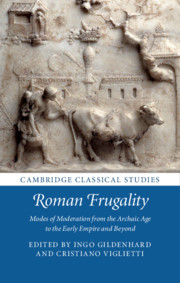
-
Select format
-
- Publisher:
- Cambridge University Press
- Publication date:
- June 2020
- July 2020
- ISBN:
- 9781108879088
- 9781108840163
- Dimensions:
- (216 x 138 mm)
- Weight & Pages:
- 0.62kg, 428 Pages
- Dimensions:
- Weight & Pages:
- Series:
- Cambridge Classical Studies
Book description
Roman Frugality offers the first-ever systematic analysis of the variants of individual and collective self-restraint that shaped ancient Rome throughout its history and had significant repercussions in post-classical times. In particular, it tries to do the complexity of a phenomenon justice that is situated at the interface of ethics and economics, self and society, the real and the imaginary, and touches upon thrift and sobriety in the material sphere, but also modes of moderation more generally, not least in the spheres of food and drink, sex and power. Adopting an interdisciplinary approach drawing on ancient history, philology, archaeology and the history of thought, the volume traces the role of frugal thought and practice within the evolving political culture and political economy of ancient Rome from the archaic age to the imperial period and concludes with a chapter that explores the reception of ancient ideas of self-restraint in early modern times.
Contents
Metrics
Altmetric attention score
Full text views
Full text views help Loading metrics...
Loading metrics...
* Views captured on Cambridge Core between #date#. This data will be updated every 24 hours.
Usage data cannot currently be displayed.
Accessibility standard: Unknown
Why this information is here
This section outlines the accessibility features of this content - including support for screen readers, full keyboard navigation and high-contrast display options. This may not be relevant for you.
Accessibility Information
Accessibility compliance for the PDF of this book is currently unknown and may be updated in the future.


